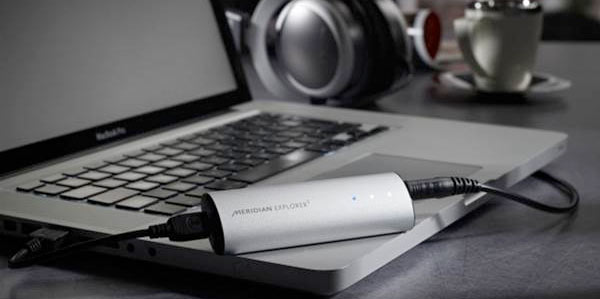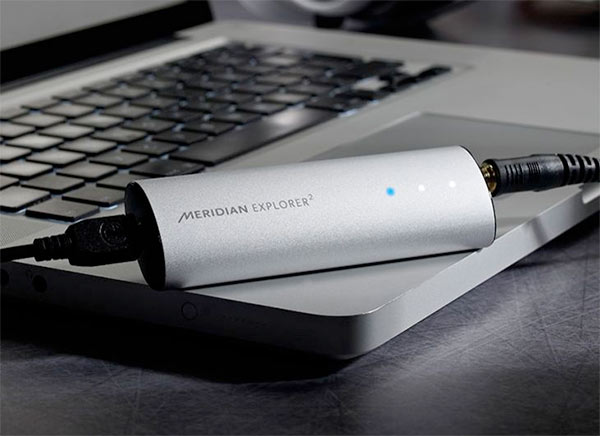First MQA-Compatible DAC from Meridian
The new MQA technology announced by Meridian last week (see previous posts) has the potential to shake things up in the world of high-resolution digital streaming and downloading. But to enjoy the benefits of MQA (Music Quality Authenticated), the entire signal path has to include the encoding and decoding of the MQA audio. And consumers will have to have equipment capable of decoding the encoded streams. Enter the new version of the Meridian Explorer 2. This small, low cost (lists for $299), portable DAC can decode audio streams that have been encoded with the MQA process. It’s the first DAC on the planet that can do this trick.
Figure 1 – The Meridian Explorer 2 MQA-capable DAC
The Explorer 2 is the successor to the Explorer. It packs more DSP power inside so the device can do some tricky signal processing on any incoming signal. This includes “resolution enhancement”, which is described as:
“…the Explorer2 upsamples all input signals to 176.4/192 kHz (4x standard sample rates) – 4x streams are played at full resolution with no downsampling – and includes Meridian’s proprietary Apodising filter, which minimizes pre-ringing for a clearer, more transparent sound, while at the same time removing digital filter artifacts from earlier digital recordings so that they can actually sound better than they did in the studio.”
I’m all in favor of clearer, more transparent sound but I’m not in favor of upsampling to get there. My 96 kHz/24-bit tracks are already very clear and transparent…moving them to 192 kHz might make the filtering easy but I play them back using my Benchmark DAC2 and they sound as I intended. The actual fidelity of an upsampled file doesn’t change…however, the sound might change based on the sample rate and filters.
Here’s some additional features of the unit.
Apodising Filters
“Filters are critical in digital audio. Commonly they introduce distortion and harshness because of “pre-ringing”. Early digital recordings suffer from harshness too, due to primitive filters. After painstaking research, Meridian developed a special filter that avoids pre-ringing, so it can be steeper, cleaning up the effects of early filters. The result: a better, cleaner sound from recordings old and new.”
MQA
“Sourced from the original studio master recording as approved by the creative team, MQA combines an advanced new digital sampling technology that captures extremely high frequency timing and detail in an audio signal with an equally novel system to ‘encapsulate’ that data into a form for delivery using any lossless file format or streaming. The listener’s decoder reconstructs the entire original signal, bringing up an indicator confirming that what they are hearing is exactly the same as the original master. Without the decoder, the listener enjoys CD quality reproduction. Its most advanced form, ‘MQA Studio’, uses the technology in the studio to generate an even higher quality master recording as the source.”
Where are the MQA encoded files going to come from? The labels that I know that are actually producing high-resolution audio files might find some benefit from smaller files but I have some doubts whether downloading an MQA encoded file that might be 10 times smaller will be more attractive than sticking with the uncompressed PCM file. I know audiophiles that won’t go near FLAC files because they worry about the “sonic degradation” of the FLAC codec.
And the major labels will have to do all of the work they’ve been doing for HDtracks and others all over again. The folks at Meridian have a major chicken and egg dilemma on their hands. Stay tuned.
+++++++++++++++++++
I’m still looking to raise the $3700 needed to fund a booth at the 2015 International CES. I’ve received some very generous contributions but still need to raise additional funds. Please consider contributing any amount. I write these posts everyday in the hopes that readers will benefit from my network, knowledge and experience. I hope you consider them worth a few dollars. You can get additional information at my post of December 2, 2014. Thanks.



I believe you’ll find that the Benchmark DAC, as well as virtually every other modern DAC, is upsampling the signal.
I’ll ask John Siau, the designer of the DAC2, whether the incoming digital stream is upsampled and let you know.
In response to your 12-10-2014 post ” I know audiophiles that won’t go near FLAC files because they worry about the “sonic degradation” of the FLAC codec.”
FLAC and ALAC are bit-for-bit binary identical to pcm uncompressed. Coming from you, Mark, Waldrep, this posting is ludicrous. I am an audio engineer with 30+ years experience and have 8 US Patents issued in audio related technology. Please keep the integrity in your postings. Thank you.
Jim…I’m with you on this. Read the pieces in The Absolute Sound magazine that offer a contrary view. I simply said that I know people that believe it….not that I do.
Apple is the Big Winner for two reasons:
1. Encapsulating “mastered for iTunes” 96 kHz files and selling them for audiophile purposes, whether in streaming mode or as downloads.
2. Placing a converter within the Beats headphones for wireless high-fidelity and space saving in iPhones.
Everyone wins for MQA streaming. Bluetooth/ApX will allow current tech to deliver MQA wirelessly.
We’ll see. It would be a big win for Meridian for sure.
Hello Mark,
I read this today morning. Promates: The World’s First DXD Download Store http://www.stereophile.com/content/promates-worlds-first-dxd-download-store
The question is now which new format will win the race. Both promoters claim that their codec sounds superior. Not many were able to hear a DXD file. MQA nobody has heard.
At the moment DXD is a bit ahead. Almost every new DAC that was launched in the last two years or so is DXD capable. And there are now 25 files (imagine 25!) from Promates available plus a few more from 2L.
But one thing is clear for me. DSD has no chance anymore to become a format that can exist besides PCM (incl. DXD) and MQA.
Stick’em up partner. Either pay up for the decoder or your encoded HD files will be down sampled to CD spec.
No thanks, I’ll pass
And just a day or so back we were writing about the resistance to HD in the marketplace do to cost. Now they want to hold us up for decoding equipment as cost of entry.
Not exactly Sal. The MQA initiative is meant to allow streaming of analog masters transfers in a smaller footprint. Those with the decoders will be able to get the quality of the 192 kHz/24-bit transfers faster and smaller. If you don’t have the decoder, the file isn’t downsampled to a CD (after all the analog tape original has less fidelity than the CD)…it merely remains at the spec of the original file, whatever that was.